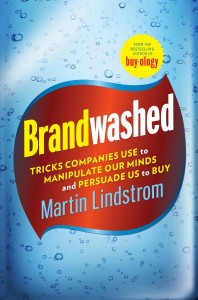Martin Lindstrom Answers Your Questions on Brandwashed

Last week, we solicited your questions for Martin Lindstrom, a marketing consultant and author of the new book Brandwashed: Tricks Companies Use to Manipulate Our Minds and Persuade Us to Buy.
Now, Lindstrom returns with his answers to a few of them. As always, thanks to everyone who participated.
Q One more question occurred to me: Marketing is intended to persuade us to buy products, but it also serves another latent function, which is to educate us about new products, about differences between products or about the products themselves. Given this educational benefit, among other benefits, do you think marketing is a net good or a net bad for society on the whole? – NZ
A Some 30 years ago, when Russia was the USSR, brands did not really exist. Yes, Pepsi was present due to an agreement made between the then-U.S. president and the leadership of the USSR, but besides that there was only one product per category. When I investigated this, I realized that this was not entirely true. When “the” fridge was produced (remember there was only one model in total), the manufacturing staff would mark certain refrigerators in order to indicate that more time and better materials went into the production of that particular fridge. At first, these fridges were produced specifically for the senior officials of the government (and the company), however rumours spread, and soon the staff was getting hold of the marked refrigerators whenever they secured the rights to buy “the” fridge. Word continued to get out, and consumers began to search for the marked fridges. The reality: The company had given birth to a brand without knowing it. If you had two choices — to either live in the USSR without (almost) any brands (one toothpaste option, one car option, one canned soup option), or to live in our world with hundreds of choices within each category (attached with millions of ads, billboards and TV commercials) — which option would you go for? No options — no advertising. Yes, advertising is there to inform — but it is mostly there to raise awareness and ensure a strong preference. Both options reflect some pain — the question is which type of pain are you prepared to live with (I know my choice)?
Q Can you please enumerate the tricks you are using on your cover to entice people into buying your book? Do you find using such tricks to be hypocritical? If attempting to use no such tricks could be considered a trick, how would you recommend a product make itself completely generic as a protest against branding? – Mike B
A I had numerous discussions with my team about how to promote the book – or if to do it, at all. I decided to go to the extreme by reflecting all the techniques spelled out in my book and to make it so glaringly obvious as to be almost comical. Needless to say, my “branding in the womb” video plays on this deliberately while trying to make two points: 1) That this actually happens (that we’re affected while still in the womb) and 2) That fear has an effect on us. By pushing the fear button as hard as I do (and in such an obvious way), I want to make the viewer understand the message and say – “I get it.”
Q If I know that marketeers are using heuristics like herding and endowment effects to sell me stuff, does this make me immune to marketing? –Chris Markham
A The fact that you’re aware only makes you “kind of” immune to some of the tricks used in retail, marketing and advertising — as awareness makes you think before you buy. However, in certain cases it has absolutely no effect on you — if you don’t believe me, check out my column in this week’s edition of of TIME. After you have finished reading it, I think you will understand what I mean (perhaps — as there’s a twist to the article I can’t tell you about…but I think you’ll get it!).

Comments